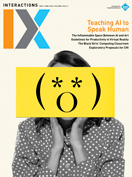Authors:
Angela E. B. Stewart
Taya wants to create a robot that looks like her. Taya's signature hairstyle is an Afro puff, with a large pink bow, and she wants her robot to have one too. Throughout her week at a robotics summer camp, she iterates on her design, using tulle, pipe cleaners, and other materials to make her robot's hairstyle. After telling her peers and the teacher about her goal to create an Afro puff, Taya gets a suggestion to use a ping-pong ball. She adjusts her design by wrapping colorful yarn around the ball to mimic the style and texture of her hair. At the end of the week, Taya joyfully takes part in the Robot Runway showcase, where she gets to tell others about her creation and the robot she made in her likeness.
→ To create equitable computing education, we must examine how we uphold systems of oppression in our own lives.
→ Engage joy and criticality in your computing education practice.
This vignette comes from a two-week summer camp for Black girls in Pittsburgh. This kind of joyful self-expression is what all learners deserve in their educational experiences. Yet it is not the reality for many Black girls. When looking at the U.S. education system, we see that Black girls are subject to psychological violence that seeks to subjugate them to white supremacist and patriarchal standards [1]. Computing education is part of this systemic oppression by reinforcing dominant narratives that Black girls are not creators of technology [2]. When Black girls do break into computing spaces, they are subject to toxic environments [3] where their knowledge and critical social perspective are not valued [4].
Computing education is the gateway for learners to become technology designers in the future. As outlined above, however, dominant norms systemically exclude Black girls from the technology design processes. Thus, HCI pedagogies must be reimagined to interrogate who gets to design, and for what purposes. To do this, we must redefine our own perspective as computing education researchers and practitioners to value Black girls as the imaginative innovators they are and center their joy and self-expression. Here, I present reflections from a multiyear research project that centers Black girls in computing education, and insights into how researchers and practitioners can enact these values in their own work.
This work is done as a partnership between researchers at the University of Pittsburgh, Carnegie Mellon University, and Arizona State University, as well as two community organizations in Pittsburgh. Over the past four years, we have collaboratively created out-of-school learning opportunities focused on robotics and AI topics. The form of the learning experiences has been diverse, including multiweek summer camps and semester-long after-school programs for children, as well as multigenerational learning opportunities on nights and weekends. The research team has engaged with teachers and administrators at the community programs to conceptualize learning experiences, better understand the social context of the programs, and discuss research findings. We have also conducted multilevel mentoring and professional development for scholars, including undergraduate and graduate students, faculty, and staff.
To move toward equity, we must start with the uncomfortable truth that we ourselves uphold systems of oppression—in our attitudes and beliefs and in our interactions with Black girls and with one another. For example, dominant narratives around Black girls' computing education speak of them as though they need to be inspired to join computing. This appears as the narrative of empowering Black girls by giving them the gift of computing. This mindset, however, assumes that Black girls lack interest in or knowledge of computing. Simply by teaching them what you know, you can inspire them to be a technologist. This narrative privileges the teacher's viewpoint and doesn't consider the knowledge, culture, and identities that Black girls bring as assets to their learning.
Starting with the self also means we must gain a broader understanding of the ways computing upholds systems of oppression. Without perpetual self-education, we fail to engage with the reality of how computing both extends systems of oppression and forms new ones. This upholds the status quo of computing education, which is to believe technology is unbiased and generally good for the world [5] and that technologists are responsible only for technical correctness and not broader ethical implications [6].
To start with the self, researchers on our project engage in culturally responsive professional development led by Tara Nkrumah at Arizona State University. The professional development centers around Paulo Freire's "Pedagogy of the Oppressed" [7]. In this training, researchers engage in theater-based activities that support reflection on how power exists in their world and how they themselves can be agents of social change. These professional development sessions are supplemented with readings on topics of culturally responsive pedagogical strategies or oppression and liberation in computing. We center the writings of marginalized scholars, such as Black and Indigenous people, women, queer scholars, or scholars with disabilities. I myself have found inspiration by reading the work of scholars such as Nicki Washington, Christina Harrington, Ruha Benjamin, Cynthia Bennett, Virginia Eubanks, and Patricia Hill Collins.
In our work, we found ourselves navigating the tension between engaging Black girls' criticality of technology and joyful experiences that center their self-expression. Both are elements of anti-oppressive computing education. By centering criticality, learners build skills to recognize when systems of oppression are at play in technology design, imagine a different future, and take actions toward realizing that in their own lives and communities. Without intentionally taking a critical pedagogical approach, we will continue to teach learners to conform to dominant norms, rather than disrupt systems of oppression. That said, trauma-informed strategies are necessary to navigate these topics in learning spaces, as they can be psychologically stressful for Black girls who are constantly subject to racist and sexist experiences.
Black girls are subject to psychological violence that seeks to subjugate them to white supremacist and patriarchal standards.
Criticality by itself is not enough. Black girls' joy and self-expression are also key elements of anti-oppressive computing education. Joy and self-expression can be seen as a pathway to engaging Black girls in computing, but I argue that it is an end in and of itself. Joyful self-expression with computing technologies makes space for Black girls to understand, define, and express who they are and use technology to further their own goals. In turn, they reject the racist and sexist messaging that they are consumers of technology or should use technology as a means to a job, working for someone else's goals and not their own.
In our work, we balance this tension by holding space for Black girls to bring their own interests and experiences to the learning environment. For example, a number of girls in our summer camp are part of a dance team. They were excited to show off their choreography to the teachers, sharing an activity that brings them joy. This was, in turn, used as a learning opportunity to talk about algorithms and conditionals. For example, under certain conditions a teacher or learner would perform a dance move, similar to an if-statement in programming. Outside of these specific lessons, some learners even programmed their robot to dance. All of these activities were surrounded by conversations on identity and how our identity affects the way we experience and move through the world. Many girls brought up dance as a core part of their identity and a space where they experience community and joy.
Criticality by itself is not enough. Black girls' joy and self-expression are also key elements of anti-oppressive computing education.
 Go Forth and Disrupt Oppression
Go Forth and Disrupt Oppression
Attending to our personal actions and beliefs and creating individual learning experiences for Black girls is an important method of disrupting oppression. However, it is important for this to scale beyond individual people and programs. As oppression is systemic, so too must be our solutions. Therefore, to create anti-oppressive computing education experiences for Black girls and all learners, we must consider how we are disrupting structures and advocating for policies that support equity for Black girls. This can be by working with local school boards and governments to change policies, or working with other researchers to shift how we think about knowledge-building in the academy. Collectively, we can create a better computing education landscape for Black girls.
I'd like to acknowledge my collaborators Tara Nkrumah, Erin Walker, Amy Ogan, Leshell Hatley, and Kimberly Scott and their research teams for their continuous intellectual contributions to this project. I'd also like to acknowledge my community partners for creating liberatory spaces for learners in Pittsburgh, and allowing us to work alongside you in your mission.
1. Love, B.L. We Want to Do More Than Survive: Abolitionist Teaching and the Pursuit of Educational Freedom. Beacon Press, 2019.
2. Scott, K.A., Sheridan, K.M., and Clark, K. Culturally responsive computing: A theory revisited. Learning, Media and Technology 40, 4 (2015), 412–436.
3. Washington, A.N. When twice as good isn't enough: The case for cultural competence in computing. Proc. of the 51st ACM Technical Symposium on Computer Science Education. ACM, New York, 2020, 213–219.
4. Gebru, T. The hierarchy of knowledge in machine learning & related fields and its consequences. Human-Computer Interaction Institute Seminar, Carnegie Mellon University, Pittsburgh, PA, 2021.
5. Broussard, M. Artificial Unintelligence: How Computers Misunderstand the World. MIT Press, 2018.
6. Fiesler, C., Garrett, N., and Beard, N. What do we teach when we teach tech ethics? A syllabi analysis. Proc. of the 51st ACM Technical Symposium on Computer Science Education. ACM, New York, 2020, 289–295.
7. Freire, P. Pedagogy of the oppressed. In Toward a Sociology of Education. Routledge, 2020, 374–386.
Angela E.B. Stewart is an assistant professor at the University of Pittsburgh School of Computing and Information and Learning Research and Development Center. She was named a 2021–22 Emerging Scholar by the International Society of the Learning Sciences, and recently received a National Science Foundation Racial Equity in STEM Education award. [email protected]
Copyright held by author. Publication rights licensed to ACM.
The Digital Library is published by the Association for Computing Machinery. Copyright © 2024 ACM, Inc.









Post Comment
No Comments Found